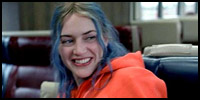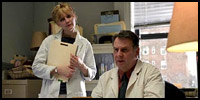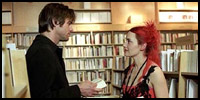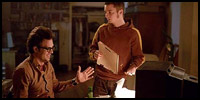
 |
|
Eternal Sunshine of the Spotless Mind (2004) Cast: Jim Carrey, Kate Winslet, Kirsten Dunst, Mark Ruffalo, Elijah Wood, Tom Wilkinson, Jane Adams, David Cross, Deirdre O'Connell, Thomas J. Ryan, Ryan Whitney, Debbon Ayer, Lola Daehler 2004 – 108 minutes Rated: Reviewed by Dustin Putman, March 20, 2004.  Screenwriter Charlie Kaufman may be eccentric, but one cannot deny the joyful innovation and lovable quirkiness he brings to each of his projects, not the least of them being 1999's "Being John Malkovich" and 2002's "Adaptation" (my pick for the best film of that year). Where Kaufman formulates his ideas may be one of cinema's most mystifying questions. A simple plot synopsis is nearly impossible, at the risk of coming up with a description that may confuse or turn off potential viewers. To see Charlie Kaufman's scripts brought to filmic life is the only way to truly understand Kaufman's oeuvre. They have a magic about them, a style and warmth all their own, that jumps vibrantly off the page and comes together on celluloid with the seeming ease it might take to cobble together a formula picture. Only Kaufman's films are anything but formulaic; he simply knows exactly what he's doing every step of the way.
Screenwriter Charlie Kaufman may be eccentric, but one cannot deny the joyful innovation and lovable quirkiness he brings to each of his projects, not the least of them being 1999's "Being John Malkovich" and 2002's "Adaptation" (my pick for the best film of that year). Where Kaufman formulates his ideas may be one of cinema's most mystifying questions. A simple plot synopsis is nearly impossible, at the risk of coming up with a description that may confuse or turn off potential viewers. To see Charlie Kaufman's scripts brought to filmic life is the only way to truly understand Kaufman's oeuvre. They have a magic about them, a style and warmth all their own, that jumps vibrantly off the page and comes together on celluloid with the seeming ease it might take to cobble together a formula picture. Only Kaufman's films are anything but formulaic; he simply knows exactly what he's doing every step of the way.
 Directed by Michel Gondry (who previously adapted Kaufman's lesser-known 2002 film, "Human Nature"), "Eternal Sunshine of the Spotless Mind" is a trippy, oddball journey that literally takes you through a person's memories. It visualizes, quite successfully, the feeling of a dream come to life, while possessing the tone of a star-crossed love story between two people destined to be together. In no short order, the results are genuinely romantic, nostalgic, funny, frightening, and ultimately heartbreaking.
Directed by Michel Gondry (who previously adapted Kaufman's lesser-known 2002 film, "Human Nature"), "Eternal Sunshine of the Spotless Mind" is a trippy, oddball journey that literally takes you through a person's memories. It visualizes, quite successfully, the feeling of a dream come to life, while possessing the tone of a star-crossed love story between two people destined to be together. In no short order, the results are genuinely romantic, nostalgic, funny, frightening, and ultimately heartbreaking.
 Told primarily in reverse chronology, Joel Barish (Jim Carrey) is devastated when he goes to see the love of his life, Clementine (Kate Winslet), only to discover that she has no idea who he is and already has a new boyfriend, Patrick (Elijah Wood). His investigation into what has happened leads him to a seedy company called Lacuna, headed by Dr. Howard Mierzwiak (Tom Wilkinson), that specializes in completely erasing the memory of people from one's brain. Unable to think of a life without Clementine, Joel decides to have the operation.
Told primarily in reverse chronology, Joel Barish (Jim Carrey) is devastated when he goes to see the love of his life, Clementine (Kate Winslet), only to discover that she has no idea who he is and already has a new boyfriend, Patrick (Elijah Wood). His investigation into what has happened leads him to a seedy company called Lacuna, headed by Dr. Howard Mierzwiak (Tom Wilkinson), that specializes in completely erasing the memory of people from one's brain. Unable to think of a life without Clementine, Joel decides to have the operation.
 From here, the film takes a turn toward a nearly constant dream-like state, as Joel's relationship with Clementine is played in reverse in his mind, each time culminating in her erasure from his memory. It is no secret that their relationship ended rockily, but as Joel travels closer to the point where they met, he is faced with times in his life with Clementine where he had never been happier and more at peace. Making the decision too late that he doesn't want her wiped out of his life, Joel tries to find a way to bury Clementine in deep-seated memories where he hadn't yet known her, in a desperate bid to keep her with him. The very nature of one's memories, even the negative ones, after all, offer life experiences that mold you into who you are; they are personal, unpalatable things that shouldn't be traded for the world.
From here, the film takes a turn toward a nearly constant dream-like state, as Joel's relationship with Clementine is played in reverse in his mind, each time culminating in her erasure from his memory. It is no secret that their relationship ended rockily, but as Joel travels closer to the point where they met, he is faced with times in his life with Clementine where he had never been happier and more at peace. Making the decision too late that he doesn't want her wiped out of his life, Joel tries to find a way to bury Clementine in deep-seated memories where he hadn't yet known her, in a desperate bid to keep her with him. The very nature of one's memories, even the negative ones, after all, offer life experiences that mold you into who you are; they are personal, unpalatable things that shouldn't be traded for the world.
 At its core, "Eternal Sunshine of the Spotless Mind" is a mystical motion picture about the power of fate, and how if something is meant to happen, it will, no matter what. The love story between Joel and Clementine remains lucid and true, capturing just right all of the little details about one's relationship with another that make it personal and unique. The way Joel and Clementine would burrow underneath their bed covers and bare their souls to each other. Or the way they would watch drive-in movies without actually paying to go to the drive-in, creating their own dialogue between the characters they saw on the screen while sitting in their car on the street. Or the way they liked to run on the beach after a fresh snowfall. Or the way they would lay down on iced-over ponds, gazing up at the constellations in the sky. Scenes like these, small and pure, are beautiful both in their conception and execution.
At its core, "Eternal Sunshine of the Spotless Mind" is a mystical motion picture about the power of fate, and how if something is meant to happen, it will, no matter what. The love story between Joel and Clementine remains lucid and true, capturing just right all of the little details about one's relationship with another that make it personal and unique. The way Joel and Clementine would burrow underneath their bed covers and bare their souls to each other. Or the way they would watch drive-in movies without actually paying to go to the drive-in, creating their own dialogue between the characters they saw on the screen while sitting in their car on the street. Or the way they liked to run on the beach after a fresh snowfall. Or the way they would lay down on iced-over ponds, gazing up at the constellations in the sky. Scenes like these, small and pure, are beautiful both in their conception and execution.
 In one of his most dramatic roles yet, Jim Carrey (2003's "Bruce Almighty") proves why he is such a rare find—a talent who is not only enormously funny, but can reel in his zaniness and create a performance of astonishing range and subtlety. Carrey's Joel believes himself to be boring, and doesn't speak much because of it. Clementine is the exact opposite, a colorful young woman who changes her hair color practically every week and seems to talk a lot to hide her insecurities. Together, they make the perfect match. Kate Winslet (2003's "The Life of David Gale"), who is on a roll with her second modern-day part in a row after years of wearing nothing onscreen but a corset, is a joy to behold as Clementine. She is lovable without trying to be, funny without having to show off, and masks a darker, more sorrowful side under a mostly positive exterior. Carrey and Winslet exude just the right chemistry—a destined connection—to make the love story between them ring with emotion and vitality.
In one of his most dramatic roles yet, Jim Carrey (2003's "Bruce Almighty") proves why he is such a rare find—a talent who is not only enormously funny, but can reel in his zaniness and create a performance of astonishing range and subtlety. Carrey's Joel believes himself to be boring, and doesn't speak much because of it. Clementine is the exact opposite, a colorful young woman who changes her hair color practically every week and seems to talk a lot to hide her insecurities. Together, they make the perfect match. Kate Winslet (2003's "The Life of David Gale"), who is on a roll with her second modern-day part in a row after years of wearing nothing onscreen but a corset, is a joy to behold as Clementine. She is lovable without trying to be, funny without having to show off, and masks a darker, more sorrowful side under a mostly positive exterior. Carrey and Winslet exude just the right chemistry—a destined connection—to make the love story between them ring with emotion and vitality.
 In a supporting role that misleadingly appears to be a throwaway until a key story development at the beginning of the third act gives her sudden importance and depth, Kirsten Dunst (2003's "Mona Lisa Smile") is excellent as Lacuna receptionist Mary. Dunst is intentionally humorous and flighty at the onset, and unexpectedly touching near the end, a carefree girl who must reevaluate everything she thought she knew after making a key discovery about herself. Rounding out the cast, Mark Ruffalo (2003's "In the Cut") and Elijah Wood (2003's "The Lord of the Rings: The Return of the King") are Lacuna assistants Stan and Patrick, the latter of whom secretly pines for Clementine, while the underrated gem that is Jane Adams (1998's "Happiness") warmly plays Joel's tight-knit sister, Carrie.
In a supporting role that misleadingly appears to be a throwaway until a key story development at the beginning of the third act gives her sudden importance and depth, Kirsten Dunst (2003's "Mona Lisa Smile") is excellent as Lacuna receptionist Mary. Dunst is intentionally humorous and flighty at the onset, and unexpectedly touching near the end, a carefree girl who must reevaluate everything she thought she knew after making a key discovery about herself. Rounding out the cast, Mark Ruffalo (2003's "In the Cut") and Elijah Wood (2003's "The Lord of the Rings: The Return of the King") are Lacuna assistants Stan and Patrick, the latter of whom secretly pines for Clementine, while the underrated gem that is Jane Adams (1998's "Happiness") warmly plays Joel's tight-knit sister, Carrie.
 If "Eternal Sunshine of the Spotless Mind" is boundlessly original and fascinating, a film not quite like any other ever made, it nonetheless has trouble reaching the lofty heights of either "Being John Malkovich" or "Adaptation." All of the little moments from Joel and Clementine's relationship are, indeed, on view, but too much seems to be missing from the trajectory of their faltering romance to give the viewer the complete and full picture. Instead, we are forced to fill in the blanks ourselves, which works some of the time but is unsatisfying at other points. The subplots involving Mary and the assistants, which occur parallel to Joel's memory travelogue, occasionally take the viewer out of what should be the sole focus. There is a purpose to these real world interludes, but they still give the picture a certain unevenness.
If "Eternal Sunshine of the Spotless Mind" is boundlessly original and fascinating, a film not quite like any other ever made, it nonetheless has trouble reaching the lofty heights of either "Being John Malkovich" or "Adaptation." All of the little moments from Joel and Clementine's relationship are, indeed, on view, but too much seems to be missing from the trajectory of their faltering romance to give the viewer the complete and full picture. Instead, we are forced to fill in the blanks ourselves, which works some of the time but is unsatisfying at other points. The subplots involving Mary and the assistants, which occur parallel to Joel's memory travelogue, occasionally take the viewer out of what should be the sole focus. There is a purpose to these real world interludes, but they still give the picture a certain unevenness.
 All of the plot elements arrive full circle in the finale, as Joel and Clementine must face the prospect of getting to know each other a second time with the knowledge of where things may once again lead. The notion of such is daunting and powerful, and the film strikes all of the right notes between bittersweet drama and weighty pathos. "Eternal Sunshine of the Spotless Mind," which gets its name from one of the many quotes Mary likes to recite, is an unconventional delight. Problematic as some of its details may be, the core of the film is unfaltered with candid truthfulness and the nostalgia of memories that make love worth fighting for.
All of the plot elements arrive full circle in the finale, as Joel and Clementine must face the prospect of getting to know each other a second time with the knowledge of where things may once again lead. The notion of such is daunting and powerful, and the film strikes all of the right notes between bittersweet drama and weighty pathos. "Eternal Sunshine of the Spotless Mind," which gets its name from one of the many quotes Mary likes to recite, is an unconventional delight. Problematic as some of its details may be, the core of the film is unfaltered with candid truthfulness and the nostalgia of memories that make love worth fighting for.
|
© 2004 by Dustin Putman |














